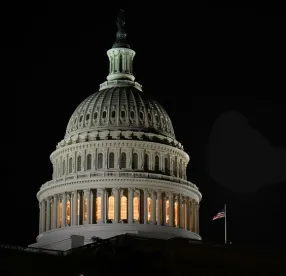A bill in Congress would significantly amend the Dodd-Frank Wall Street Reform and Consumer Protection Act (Pub. L. 111–203) to change what institutions might be designated a systemically important risk requiring additional scrutiny. This change may result in reduced regulation of smaller banks.
The “Systemic Risk Designation Improvement Act of 2016” (H.R. 6392), introduced by Representative Blaine Luetkemeyer (R-Mo.), passed in the House (254 – 161). It was received by the Senate on December 5, 2016. The White House has threatened to veto the bill.
Under the Dodd-Frank Act, the Federal Reserve must more closely evaluate banks with assets of at least $50 billion. H.R. 6392 would amend the Act by eliminating the $50-billion threshold and establishing a new, higher minimum asset level at which a bank will be considered “systematically important.” A financial institution under this designation is given enhanced scrutiny. In addition, the Financial Stability Oversight Council (“FSOC”) would employ a more comprehensive approach to assessing the risk a bank’s holding company could pose to U.S. financial stability before labeling it “systemically important.” Factors the FSOC will consider under this approach include size, interconnectedness, complexity, cross-jurisdictional activity, and available substitutes.
The practical effect of this legislation would shield many community and regional banks from the intense scrutiny of the Dodd-Frank Act. Proponents of the bill believe this change will better tailor the regulation of banks to actual risk, as opposed to relying solely on asset size as an indicator, and will lead to more effective regulation. Opponents are concerned that under the proposed approach, eliminating a clear line of exemption in favor of regulatory discretion, by definition, will introduce uncertainty, lack of clarity, and, possibly, a higher cost of doing business.
While H.R. 6392 would not repeal the Dodd-Frank Act, as promised by President-elect Donald Trump during his campaign, it would change the applicability and the framework of current financial services regulation. The bill may pass in the post-election political climate, notwithstanding complaints that the proposed FSOC-designation review would take years to finish.




 />i
/>i
